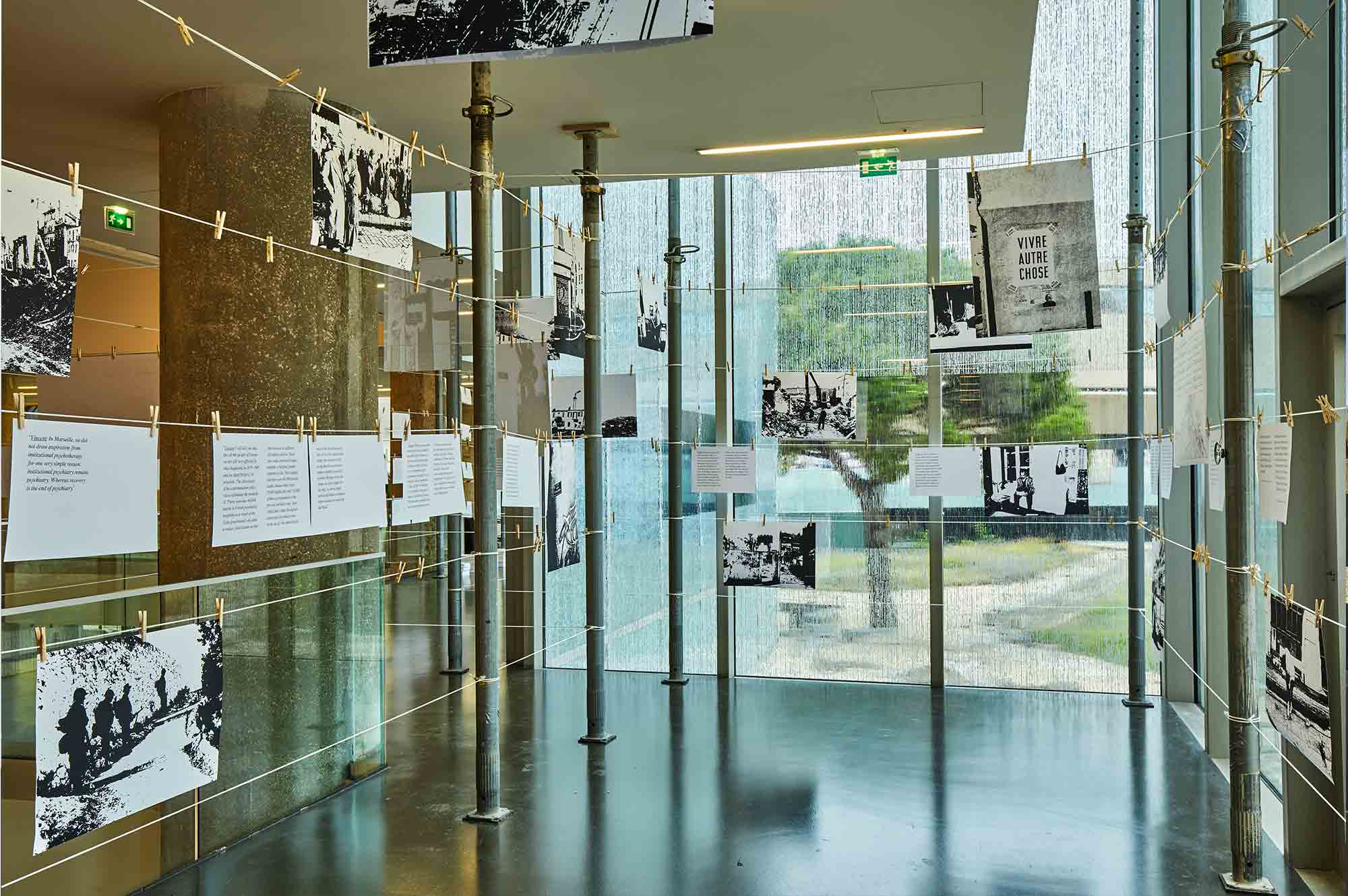Samia Henni’s (b.1980, DZ/CH) work focuses on the intersections between the built environment, colonial measures and military operations from the nineteenth century until today. Her investigations of specific micro-histories of planned dispossession, exploitation and oppression disclose macro-histories of colonialism, imperialism and globalisation. Recently, her research into these spatial strategies of state control has culminated in the award-winning book Architecture of Counterrevolution: The French Army in Northern Algeria (EN, gta Verlag, 2017; FR, Editions B42, 2019), the edited volume War Zones (gta Verlag, 2018) and the exhibition Discreet Violence: Architecture and the French War in Algeria (2017–2019; Zurich, Rotterdam, Berlin, Johannesburg, Paris, Prague, Ithaca, Philadelphia). Currently, she teaches at the College of Architecture, Art and Planning at Cornell University, USA.
Musée Grobet-Labadié
Samia Henni, Right to Housing, 2020
Trolley, mirror, floorplans
Commissioned by Manifesta 13 Marseille
Supported by Ammodo, Drosos Foundation, Pro Helvetia
Courtesy of the artist
The history of housing in Marseille is intrinsically related to the history of its harbour, colonisation, labour force, migration and the rapid industrialisation and reconstruction efforts that followed World War II. Architectural historian and theorist Samia Henni invites visitors to pause and reflect on the various housing typologies of Marseille which are not necessarily displayed in museums or given a forum in public institutions. Henni focuses particularly on shelters that host unhoused, badly housed and rehoused populations. Located in the antechamber of Musée Grobet-Labadié, Right to Housing confronts visitors with their own image, the villa’s interior and collections, and the living spaces of those who might have worked for the Grobet-Labadié family. These spaces are presented on a freestanding mirror, infinitely reflecting in the villa’s built-in mirror, which testifies to the golden age of the European bourgeoisie.
Musée d’Histoire de Marseille
Samia Henni, Housing Pharmacology, 2020
Prints, speakers, publication, clotheslines, clothespins, metallic props
Commissioned by Manifesta 13 Marseille
Supported by Ammodo, Drosos Foundation, Pro Helvetia
Courtesy of the artist
Voices: Fathi Bouaroua, Aicha Boutayeb, Vincent Girard, Habib, police officer, Laura Spica, Vendredi 13 (Monique Blanc, Bernard Nos)
Audio editing: Samia Henni
Audio postproduction and installation: Iris Rennert
Photographs: Aicha Boutayeb, Samia Henni, Kamar Idir, Vendredi 13
Publication : Samia Henni (texts editing), Laura Spica (copyediting), Flora Fettah (proofreading), Good and Cheap Art Translators (Translation), Anbar Oreizi-Esfahani (Mapping assistant), êkhô studio (Claire Bonnet, Charlie C. Thomas, Graphic concept, typesetting and design)
‘Pharmacology’ is a condition that stipulates both poison and remedy. Drawing on Jacques Derrida’s essay, Plato’s Pharmacy, which proposed that writing is a pharmakon, Bernard Stiegler theorized and broadened the idea of ‘pharmacology’ to incorporate a political analysis of and intervention into exploitative capitalist systems and the destructive tendencies of consumerist societies. Following from Stiegler, ‘pharmacology’ can thus inform the ethics and politics of care.
Based on various conversations with Marseille’s inhabitants after the lockdown was lifted in France, Housing Pharmacology exposes and juxtaposes the poisons and cures that the presence or absence of dwellings engendered in Marseille’s neighbourhoods. It reflects on the histories of the right to housing as well as human lives and deaths, examines the conditions of the unhoused in the streets of Marseille, scrutinises the status of democratic psychiatry and housing environments, questions the role that the built environment plays in guaranteeing self-care and self-subsistence and digs into the housing policies for migrant workers who participated in France’s housing construction industry and rapid economic growth during Les Trente Glorieuses (The Glorious Thirty), the thirty years from 1945 to 1975 following the Vichy Regime and World War II.
Housing Pharmacology offers multiple fragments and competing visions about Marseille’s spatial inclusions and exclusions through lived experiences, audiovisual records and published sources that interrogate the past and aspire to a more viable future. It ultimately endeavours to create potential traits d’union.s between story-telling and history-writing, between the duties of institutions and the rights of human beings.
Participants of ‘Housing Pharmacology’ (audio and photo) :
- Fathi Bouaroua is involved in the fight for the right to housing and with community movements in Marseille.
- Laura Spica is an anthropologist and member of the Collectif du 5 Novembre and Noailles Debout in Marseille.
- Aicha Boutayeb has been a social worker at Mouvement et Action pour le Rétablissement Social et Sanitaire (Movement and Action for Social and Medical Recover; MARSS), which is part of l’Assistance Publique-Hôpitaux de Marseille (Public Hospitals of Marseille), for five years.
- Vincent Girard is a psychiatrist and co-founder of the collective Mouvement et Action pour le Rétablissement Sanitaire et Social (Movement and Action for Social and Medical Recovery; MARSS) in Marseille.
- Habib, is an urban bus driver for the Régie des Transports Métropolitains (RTM; Metropolitan Transport Authority) of the city of Marseille.
- Monique Blanc and Bernard Nos are the cofounders of the non-profit organization Vendredi 13 in Marseille.
- Plainclothes police officer in Marseille
Samia Henni created a publication specifically for this project which you can read here : Pharmacologie du logement, Samia Henni, 2020.
* Work conceived for the occasion of Manifesta 13 Marseille
Samia Henni*,Sara Ouhaddou*
11.09 - 29.11.2020 The Home: Rentals, Experiences, Places
Black Quantum Futurism*,Martine Derain*,Lukas Duwenhögger,Jana Euler,Ken Okiishi*,Cameron Rowland,Reena Spaulings,Arseny Zhilyaev*,Samia Henni*
28.08 - 29.11.2020 Rencontres: Méditerranée, traits d'union?
Samia Henni*,Sara Ouhaddou*
14.09 - 16.09.2020 Listening Session #2 Une Méditerranée sonore by Radio Grenouille in collaboration with Samia Henni (registration required)
Samia Henni*
14.09 - 14.09.2020












